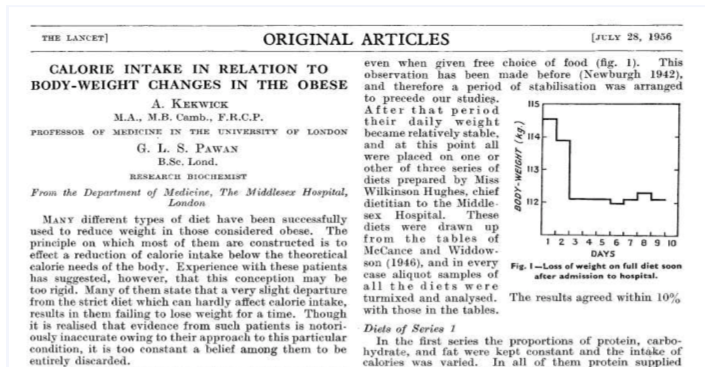Just as not all studies are created equal, neither are all calories.
This isn’t new news in the scientific literature. In fact, a study from the 1950s showed that carbohydrates, protein and fat in the diet have significantly different impacts on metabolism.

And yet today we still hear the refrain: “A calorie is a calorie is a calorie. Weight is simply a matter of calories in vs. calories out. If you want to lose weight, the solution is simple: Eat less. Move more.”
A paper published in The Lancet in 1956 by Kekwick and Pawan (embedded at the bottom of this post so you can read for yourself) tells a much different story.
The paper reported on three diet studies involving obese patients.
In the first, when the proportion of protein (20%), fat (33%) and carbohydrate (47%) calories were held constant (20%), lower daily calorie intake led to greater weight loss.
No surprise there.
But the results of two other series of diets seriously undermined the theory that “a calorie is a calorie is a calorie.”
In the second series, 14 subjects were put on three different semi-starvation diets, each of which fed them 1,000 calories per day with 90% of calories coming from either carbohydrates, protein or fat. On the 90% protein and 90% fat diets, the subjects lost 0.6-0.9 lbs. per day, while on the 90% carbohydrate diet they actually gained weight.
Let that sink in: obese subjects gained weight on 1,000 calories per day.
On a semi-starvation diet.
When the calories came from carbohydrates.
In the third diet series, patients were put on a balanced diet of carbs, protein and fat at 2,000 calories per day, which caused them to maintain or gain weight.
When they were placed on a 2,600 calorie diet that was mostly fat and protein, four out of five lost weight.
With 600 more calories each day, as long as they came from fat and protein, the patients lost weight.
This study involved a small group of subjects, and the authors noted that “many of these patients had inadequate personalities. At worst they would cheat and lie, obtaining food from visitors, from trolleys touring the wards, and from neighbouring patients…. At best they cooperated fully but a few found the diet so trying that they could not eat the whole of their meals.”
That last point is important: if patients were on a 2,600-calorie protein/fat diet and found they couldn’t eat their whole meals, that’s kind of the goal, isn’t it?
It’s reverse cheating. They can eat as much as they want…but they just don’t want.
As the authors noted, high-carb diets tend to promote water retention, while protein/fat diets lead to loss of water weight. And even though those water weight losses aren’t permanent, it still demonstrates the underlying point: your body is not a bomb calorimeter. It doesn’t “burn” calories.
While the laws of thermodynamics are true, they aren’t the major driver of body weight issues.
Different types of calories are metabolized differently.
A calorie is NOT a calorie.
This was shown more than 60 years ago. And yet well into this century the U.S. government was officially recommending 6-11 servings per day of bread, cereal, rice and pasta.
I first learned about the Kekwick-Pawan paper in The 4-Hour Body by Tim Ferriss, which led to me adopting the Slow-Carb Diet and eating eggs for breakfast every day.
Tim’s podcast also introduced me to some interesting researchers, thinkers, authors and podcasters, whose programs and publications led to others from whom I’ve learned.
I’ll introduce you to the first of these next time.
See the whole series about my health journey. Follow along on Facebook, Twitter and LinkedIn.
Thank you so much for this, Lee!
Repeating what I said on LinkedIn, I’ll heartily endorse the book Big Fat Surprise, and its ally The Case Against Sugar, each of which details the decades-long campaign of fraud perpetrated by the sugar industry to sow doubt about papers like this, and (with flat-out scientific bullying) override such evidence with the assertion “a calorie is a calorie.” Indeed it is, just as an ounce is an ounce, etc – BUT IT’s NOT THE POINT. “A calorie is a calorie” asserts that AMOUNT of energy is all that matters, which is false; it ignores that different foods are metabolized differently.
Thanks, Dave. I reviewed Big Fat Surprise in this post and plan to do some posts about Gary Taubes in this series as well.
Even carbohydrates are not all the same. Starches are different from vegetables, though both are technically carbohydrates. Adding to this confusion is that once a diet has been undertaken, the dieter is not the same and will find weight maintenance onerous. The body resists fluctuations and tends to adhere to a new set point. All of this is maddening to most dedicated health enthusiast.